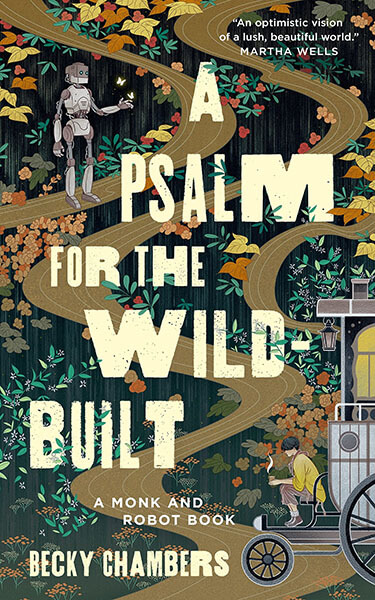“What do you need, and how might I help?”
This polite question is the core theme of a series of novellas by Becky Chambers. And yes I know I just did a review of another Becky Chambers Hugo-nominated story, but with *gestures around wildly* everything that’s going on lately I figured we could all use another optimistic sci-fi fantasy where humanity has learned to give a damn about their fellow humans and actually managed to fix most of the problems that we’re currently drowning in. Sound good?
And what a future this is. From the very first page the reader is dropped into Panga, a world that used to have all the issues that come with industrialization, but centuries ago they managed to leave the Factory Age behind, and now poverty, violence, and climate destruction are a thing of the past.
The genesis of this change was the birth of AI, when all of the robots that had been created to do humanity’s dirty work became self-aware. Their first decision as a new species was to stop working for humanity, to walk into the wilderness and figure out who they were without any interference.
And how did humanity react all those years ago to their entire workforce deciding to quit? They let them go. Wished them well, sent them on their way, and promised that the only way they’d reestablish contact was if the robots themselves made the decision to do so. This is the kind of soothing, heartwarming people that Chambers’s books are filled with, so is it any surprise that the people of Panga evolved a beautiful civilization with a plant-filled city and tree-hanging villages and a whole pantheon of benevolent gods, one of which being a god of comfort who’s monks’ only duty is traveling the countryside and giving people cups of tea?
Endless electronic ink had been spilled over the old tradition, but all of it could be boiled down to listen to people, give tea.
Sibling Dex is the monk who begins our story. They started as a garden monk in the City (no other name, Panga only has the one), but acting on unexplained dissatisfaction and a desire to hear cricket song they impulsively decide to switch vocation and become a tea monk instead. Dex gets buckets of support for their decision, a going-away party, and a pedal-powered double-level beautifully crafted cedar wagon for their travels, with lots of windows and a wind-turbine and a miniature loft designed by monks who write treatises on how to make the the most comfortable bed for any situation.
Dex has the best send-off possible, and embraces their new duty with enthusiasm (said duty being providing a restful space and a listening ear). They have the most believably awkward first attempt at giving tea and comfort to someone who’s having the worst day ever and who was really expecting someone who, y’know, knew what they were doing. Hearteningly, instead of giving up in despair, Dex decides to learn everything they can about herbs and tea. In two years they’ve become the best Tea Monk in Panga, beloved by whole communities for being able to comfort the weary and the stressed with intricately-designed teas and a good heart.
And Dex is still unsatisfied with life, so much so that they impulsively decide to head across the wilderness to an abandoned hermitage for…reasons. The story might have gone a completely different direction if a robot named Splendid Speckled Mosscap hadn’t wandered into their campsite. Mosscap is fulfilling a promise by the robots to occasionally “check in” with humanity, and it can’t go back until it’s found out “is there anything humanity needs?” It’s a question Dex feels completely unqualified to answer, but Mosscap is so enthusiastic that they find themselves letting the robot come along on a journey that they’re not even sure why they’re taking.
A blink of an eye before, they’d been setting up camp, taking a shower, roasting some veggies, preparing for a much-needed sleep. Now…now, there was a robot, sitting by their fire, asking them if they could swap a crash course in a couple centuries of human culture for back-country trail escort.
What follows is a conversation that takes place over several days, and covers so many topics it’s impossible to list them all here. Mosscap is a “wild-built” robot, made out of parts of other robots who were made out of parts of other robots, all going back centuries, so it has generational memories but is mostly still learning about the world in general and humanity in particular. And Dex has their own pre-conceptions about why they feel and believe what they do, and how they think robots feel and believe. And in many cases Mosscap and Dex find out that they’re completely wrong. But they never get defensive, or cruel, or do any of the silly things that people tend to do when they’d rather be the person that isn’t wrong about someone rather than learning how the person in front of them needs to be treated.

If you haven’t realized yet, this is a novella with little conflict and tons of comfort. This is a warm story, a cozy story, a story to read while lying in a hammock or curled up in a comfy chair while it’s raining outside. There are lovely images of the wilderness, of long-ruined buildings, of a memory of a female monk with jewelry made out of moss and solar lights woven in her hair. There’s so much humor here – like Dex’s work-around for an overwhelming need to share their food with a companion who doesn’t eat – but there’s also a lot of reassurance offered to anyone who’s kicking themselves for not figuring out what their life is supposed to be for.
I’ll definitely be reading the next installments in this series; Chambers has created a beautiful dream of humanity’s possible good future, something that I think all of us could use right about now.